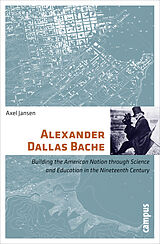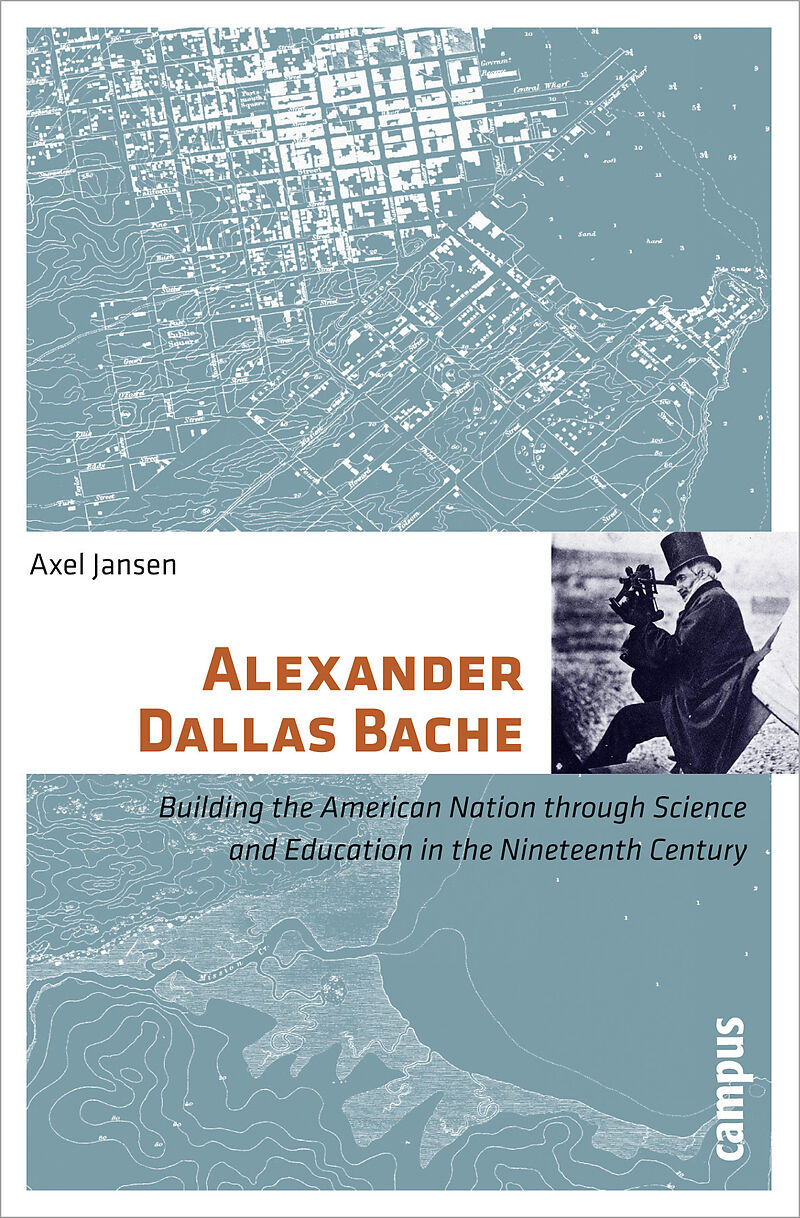Alexander Dallas Bache
Einband:
Kartonierter Einband
EAN:
9783593393551
Untertitel:
Building the American Nation through Science and Education in the Nineteenth Century
Genre:
Geschichte
Autor:
Axel Jansen
Herausgeber:
Campus Verlag GmbH
Auflage:
1. Auflage
Anzahl Seiten:
353
Erscheinungsdatum:
2011
ISBN:
978-3-593-39355-1
Alexander Dallas Bache war der Architekt des amerikanischen Wissenschaftssystems im 19. Jahrhundert, ein amerikanischer Wilhelm
von Humboldt. Als die USA im Bürgerkrieg zu zerbrechen drohten, gelang Bache 1863 die Gründung der "National Academy of Sciences". Im Namen der Wissenschaft schuf Bache damit ein Zeichen für den Fortbestand der Nation. Auf originelle Weise verknüpft Axel Jansen Biografieanalyse mit Wissenschafts- und Politikgeschichte.
"Axel Jansen's writing is exemplary in its deployment of close readings and literary perspectives to rethink large issues in the history of American science and the American state."
Theodore M. Porter, UCLA
"This challenging new perspective is a must-read for anyone interested in the various roots of modern science and professionalism."
James C. Mohr, College of Arts and Sciences Professor of History and Philip H. Knight Professor of Social Sciences, University of Oregon
"This is a book historians will not fail to read."
Thomas Haskell, Rice University
»Jansens Buch liefert ein wichtiges Stück der Wissenschafts(organisations)geschichte der USA und verhilft zu neuen Fragen in beidem liegt kein geringer Verdienst seiner Studie.« Amerikastudien/American Studies, 01.01.2013 »Jansen gelingt eine lesbare, interessante Studien, die spannende Informationen über die Professionalisierung der Wissenschaften in einer wichtigen Phase der US-Gesellschaft liefert und dank durchdachter Gliederung sowie eines gründlichen Index sich dem Leser leicht erschließt.« Historische Zeitschrift, 01.06.2013 »Axel Jansen's writing is exemplary in its deployment of close readings and literary perspectives to rethink large issues in the history of American science and the American state.« Theodore M. Porter, University of Caifornia (UCLA) »This challenging new perspective is a must-read for anyone interested in the various roots of modern science and professionalism.« James C. Mohr, College of Arts and Sciences Professor of History and Philip H. Knight Professor of Social Sciences, University of Oregon »This is a book historians will not fail to read.« Thomas Haskell, Rice University »Through keen analysis, Jansen expertly delineates Bache's significant role in professional and institutional development in the United States. Alexander Dallas Bache is a substantial contribution to both the history of science and our understanding of the development of the American nation.« Lester D. Stephens, Journal of American History, Volume 99, Issue 1, June 2012 »This is not your grandmother or grandfather's biography. [] What Axel Jansen has done in his unusual and innovative book, Alexander Dallas Bache, is deploy a particular theoretical and methodological perspective to better understand the life of the important American scientific institution builder of the mid-nineteenth century.« Earth Sciences History (2013), 32 (1)
Autorentext
Axel Jansen, PD Dr., lehrte an den Universitäten Tübingen, Heidelberg, Frankfurt am Main und Kassel sowie an der University of California, Los Angeles; seit 2016 ist er Stellvertretender Direktor des Deutschen Historischen Instituts Washington.
Leseprobe
Introduction The Curious Case of Alexander Dallas Bache In the history of American science, Alexander Dallas Bache (1806-1867), great-grandson of Benjamin Franklin, occupies a singular and unparalleled position. More than anyone else in his generation and in perhaps any generation before or since, he embodied the American scientific profession, directed its development, and shaped its institutions. Most major national scientific institutions and organizations between 1830 and 1865 relied on his support or leadership: In the 1830s, Bache was the principal organizer of Philadelphia's Franklin Institute, then the most prominent research organization in the United States. In 1843, he became the superintendent of the U.S. Coast Survey, the country's largest government-run scientific enterprise with more scientific employees than any other contemporary science-related institution including Harvard University. From 1847, Bache helped instigate and direct the American Association for the Advancement of Science (AAAS), the country's first national platform for science. He was one of the regents of the Smithsonian Institution and helped secure the post of secretary (i.e. director) for his colleague Joseph Henry in 1846. Finally, Bache helped found the National Academy of Sciences and became its first president in 1863. In view of this ubiquitous role, A. Hunter Dupree considers him (with physicist Joseph Henry and geologist John Wesley Powell) among the three "great hierarchs of federal science" in the nineteenth century, and Robert V. Bruce has concluded that Bache spoke "more authoritatively for antebellum science than anyone else." While Bache was the acknowledged leader of mid-nineteenth century American science, however, the authority for his leadership remains enigmatic. One problem is that Bache was less pioneering in his research than in his institutional efforts. In a symposium in honor of Bache's legacy, organized by the American Philosophical Society in 1941, Frank B. Jewett conceded that while Bache's contributions to science "dealt largely with [scientific problems] of recognized fundamental importance," they nevertheless concerned "departments of physics which neither then nor later could be regarded as spectacular or especially productive." In his more recent assessment, Bruce perhaps overemphasizes this point by arguing that as "a scientist, Bache fell far short of both his famous ancestor [Benjamin Franklin] and his friend Professor [Joseph] Henry." These observations reflect the fact that while Bache plays a prominent role in accounts of the institutional development of American science in the nineteenth century, he is less prominent in accounts of the development of the cognitive content of science in that period. This has left Bache with a somewhat ambivalent reputation. Bache was well connected through relatives in Pennsylvania and in federal politics. Was he not much more than an apt administrator, an institutional booster with good connections and a knack for federal fundraising? Another aspect of Bache's career complicates matters, and that is his involvement in education before 1842. While historians of American science have focused on his institutional role and his leadership in the professional community, historians of education have focused on Bache's role as president of the Girard College for Orphans and as first principal of Central High School in Philadelphia. In 1836, Bache gave up his professorship at the University of Pennsylvania in order to assume these and other educational activities. How do such efforts fit into the pattern? Was Bache interested in cultural control, a Whiggish interest in "moral and intellectual discipline" both in his educational and in his professional leadership, or was his educational involvement an extension of his administrative interests? In the absence of a comprehensive biography of Alexander Dallas Bache, and considering his extensive involvement and leadership in mid-nineteenth century American science, any attempt to clarify such issues will provide insights relevant well beyond the immediate task of identifying the motivational coordinates of his career. Bache's singular role in American science is of particular significance when considered in the context of recent developments in theories of the professions. 2. The Revised Theory of Professionalization Historians have most commonly discussed Bache's career in the context of the emergence of the American scientific community. In his pioneering work on the history of American science, A. Hunter Dupree had focused …

Leider konnten wir für diesen Artikel keine Preise ermitteln ...
billigbuch.ch sucht jetzt für Sie die besten Angebote ...
Die aktuellen Verkaufspreise von 5 Onlineshops werden in Realtime abgefragt.
Sie können das gewünschte Produkt anschliessend direkt beim Anbieter Ihrer Wahl bestellen.
Loading...
Die aktuellen Verkaufspreise von 5 Onlineshops werden in Realtime abgefragt.
Sie können das gewünschte Produkt anschliessend direkt beim Anbieter Ihrer Wahl bestellen.
| # | Onlineshop | Preis CHF | Versand CHF | Total CHF | ||
|---|---|---|---|---|---|---|
| 1 | Seller | 0.00 | 0.00 | 0.00 |
